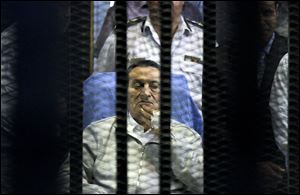
Egypt court sets May 11 for Mubarak retrial
4/17/2013
Egypt's deposed President Hosni Mubarak attends a hearing session in his retrial on appeal in Cairo, Egypt, Monday.
CAIRO — The Cairo appellate court today set May 11 for the resumption of former Egyptian President Hosni Mubarak’s retrial in the deaths of hundreds of protesters killed during the uprising that ousted him.
Also today, the country’s top prosecutor ordered Mubarak transferred back to a prison hospital from a military one where he has been since December. Mubarak remains in custody on new corruption charges after a court ordered him released earlier this week pending the retrial.
The decision to order him back to Tora prison, where his two sons remain pending a corruption trial, came after the prosecutor ordered the formation of a medical committee to look into the 84-year-old Mubarak’s health.
Mubarak appeared upbeat in his first court appearance Saturday since his conviction in June 2012. After being wheeled into the courtroom on a hospital gurney, he sat upright and grinned and waved to his supporters from inside the metal defendant’s cage.
In January, an appeals court overturned a life sentence for Mubarak on a conviction for failing to prevent the killing of 900 protesters during the 18-day uprising in 2011. He was the first Arab leader to appear in a defendant’s cage and stand trial by his own people.
The new date for the retrial was set after the judge in the case recused himself last weekend.
The judge had ordered acquittals in October for 25 Mubarak loyalists accused of organizing a deadly attack in which assailants on horses and camels stormed downtown Cairo’s Tahrir Square during the uprising.
President Mohammed Morsi’s Freedom and Justice Party, an offshoot of the Muslim Brotherhood group, criticized the judiciary for several recent acquittals.
“The acquittals of corrupt and criminal Mubarak-era figures confirms that the revolution is not complete,” party spokesman Murad Ali said in a statement. He said the acquittals highlight “dysfunction in the judiciary system.”
In an effort to boost the nation’s battered economy, some Brotherhood members have supported holding reconciliation talks with former officials to return stolen funds. The largely liberal and secular opposition has criticized such moves and say Morsi has not taken needed steps to begin reforming the judiciary.
Activists and lawyers connected to Mubarak’s retrial say there is no guarantee that new evidence will be submitted in the case. They complain about a lack of a comprehensive transitional justice program to hold Mubarak and former regime officials accountable for crimes committed during his rule, as well as the killing of protesters.
Separately, a misdemeanor court in Cairo ordered the country’s prime minister today to serve one year in prison and be removed from office for failing to implement a ruling on the privatization of a flax company. The court ruled that Prime Minister Hesham Kandil had not carried out a September 2011 court ruling regarding the sale of Tanta Flax & Oil company to Saudi businessman Abdullah al-Kaaki was invalid.
The ruling can be appealed.
A separate case on the sale of the company, based in the city of Tanta north of Cairo, is to be reviewed by the country’s Supreme Administrative Court in May.
A spokesman for the Cabinet could not be immediately reached for comment.
The sale occurred under the Mubarak regime in 2005, well before Kandil became prime minister.
Previously, company workers filed complaints to prosecutors against one of Kandil’s predecessors for not enforcing the court’s decision.
Workers have been protesting against privatization of their workplace, complaining that the government’s policies had not changed despite the uprising. They also alleged that before the uprising, company administrators tried to bribe peasants not to grow flax in order to slow production and make the sale of the company cheaper for investors and easier for the government.